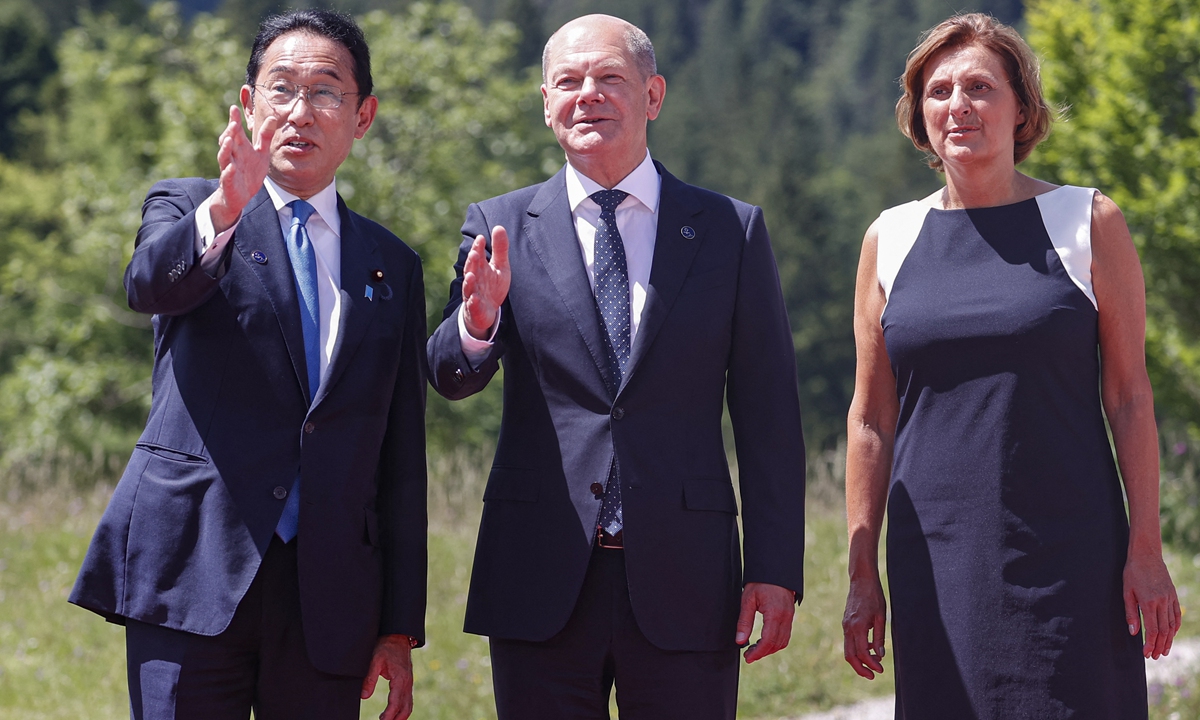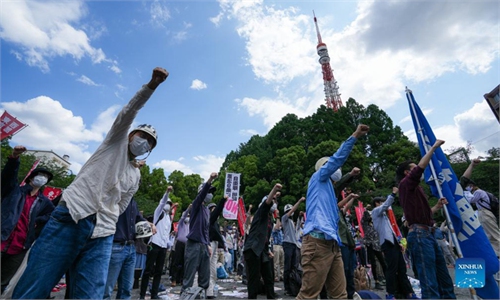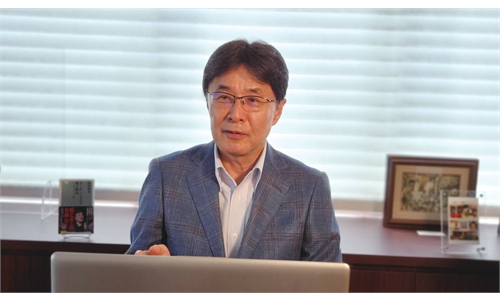Tokyo's hope for boosting cooperation with NATO exposes 'anxiety for lack of US' long-term promises' in Asia-Pacific

German Chancellor Olaf Scholz (center) with his wife Britta Ernst (right) and Japanese Prime Minister Fumio Kishida (left) attend the opening of G7 Summit at the Elmau Castle in Kruen, Germany on June 26, 2022. Photo: AFP
Japan is desperately trying to pull the US and the North Atlantic Treaty Organization (NATO) into the Asia-Pacific region to support Japan in containing China given Japan's rising strategic loneliness and anxiety over the lack of long-term US promises in the region, said Chinese analysts following the latest remarks by Japanese Prime Minister Fumio Kishida that Japan hopes to boost cooperation with NATO "to a new stage." The remarks were uttered on Saturday as Kishida prepared for a five-day trip to Europe.
On Sunday, Kishida started his European visit to attend the Group of Seven (G7) summit in Germany and then the NATO summit in Spain, the first Japanese prime minister to attend a NATO summit, according to Japanese media.
As Kishida seems to be consolidating his stance that an "expanded NATO" is indispensable by using the Ukraine crisis as an excuse and hyping the "China threat," some analysts warned that Japan's advocacy of an "Asian NATO" or "global NATO" goes against the times and could lead to a new cold war or even a hot war.
Meanwhile, some analysts believe an "expanded NATO" would be more of a bluff, considering the violent organization's actual construction capacity and the subtle ties between the US and other NATO members.
Speaking to reporters at his residence on Saturday before embarking on the Europe trip, Kishida expressed hope for boosting cooperation between Japan and NATO "to a new stage," Mainichi Shimbun reported on Sunday.
Kishida is arranging a four-way summit with South Korea, Australia and New Zealand on the sidelines of the upcoming NATO gathering, seeking a united front among the "Indo-Pacific democracies" in the face of China's growing influence, Nikkei Shimbun reported on Saturday.
The Taiwan question, South China Sea issue and East China Sea issue are likely to be covered during this NATO summit, predicted Liu Jiangyong, vice dean of the Institute of Modern International Relations at Tsinghua University.
"It seems that Japan's attendance at the NATO summit could lead to this organization's interfering in affairs in the Asia-Pacific region. But I reckon it's a bluff given NATO's actual construction capacity and the subtle ties between the US and other members," said Lü Xiang, an expert on international relations and US studies at the Chinese Academy of Social Sciences.
"Japan is even more active than the US in promoting the 'Indo-Pacific Strategy,'" Lü told the Global Times on Sunday. He said that Japan is desperately trying to pull the US and NATO into the region to suppress China given Japan's rising strategic loneliness and anxiety due to lack of long-term US promises in the Asia-Pacific.
Japan is not just simply following the steps of the US, instead it has been trying to make use of the confrontation between China and the US to achieve its own purpose of completely unleashing its military and political restrictions from the current pacifist constitution, Liu told the Global Times on Sunday.
Liu warned that the summit consisting of NATO members plus the four Asia-Pacific countries could be institutionalized, which means the aggressive alliance between the US, European countries and Japan begins to take shape, weaving a military net against China.
"To achieve the goal, Japan's external policies will become more confrontational and dangerous. Once the aggressive alliance is formed, global security will face severe threats and challenges," Liu said.
But whether NATO can achieve its ambition in expanding to the Asia-Pacific region remains a question. Lü said that the violent organization has a stronger trend of differentiation rather than solidarity.
China does not need to worry too much given its sufficient defense capacity which can assure a determined reaction to any possible provocations from NATO, Lü said.
Ahead of the NATO summit, the US has stepped up its engagement to counter China in the Pacific by colluding with Australia, Japan, New Zealand and the UK and launched an informal group -Partners in the Blue Pacific (PBP), according to a statement by the White House on Friday.
With Japan and New Zealand participating in the new anti-China platform, analysts regard the PBP as an unofficial expansion of the AUKUS alliance which includes Australia, the UK, and the US.
Japan has embarked on a dangerous path with a series of reckless domestic and foreign policies that are seriously threatening peace and stability in the Asia-Pacific and the world while New Zealand has recently jumped on the anti-China carriot after China signed various cooperation pacts with the Pacific Island countries, analysts pointed out.
The competition between major economies has sparked concern in the international community. The world is in a new situation whereby the understanding that major powers will compete with each other but stop short of damaging the peace no longer holds, Singapore's Prime Minister Lee Hsien Loong on Saturday told Singapore reporters at the close of the Commonwealth Heads of Government Meeting in Kigali, the capital of Rwanda.



